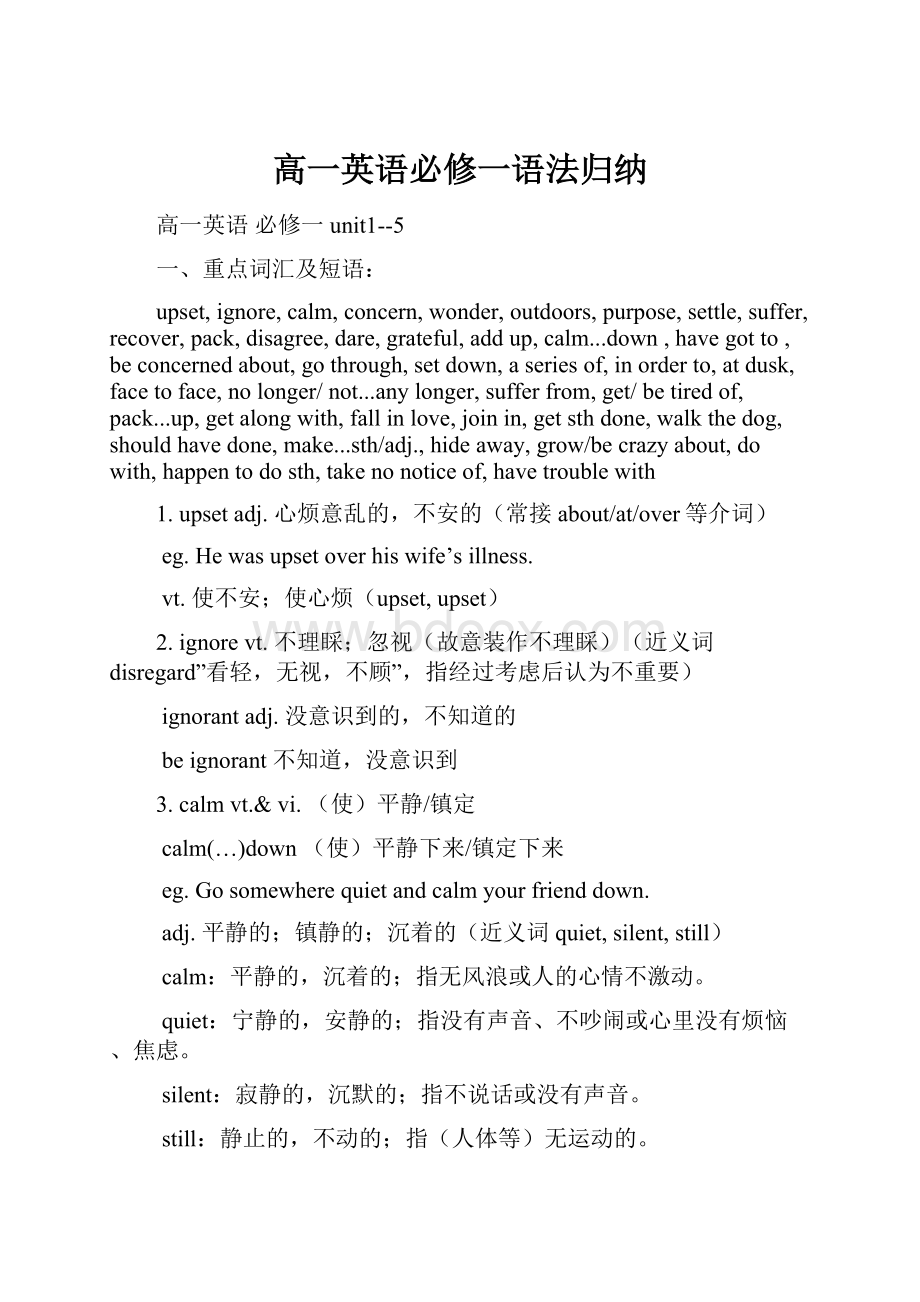高一英语必修一语法归纳.docx
《高一英语必修一语法归纳.docx》由会员分享,可在线阅读,更多相关《高一英语必修一语法归纳.docx(43页珍藏版)》请在冰豆网上搜索。

高一英语必修一语法归纳
高一英语必修一unit1--5
一、重点词汇及短语:
upset,ignore,calm,concern,wonder,outdoors,purpose,settle,suffer,recover,pack,disagree,dare,grateful,addup,calm...down,havegotto,beconcernedabout,gothrough,setdown,aseriesof,inorderto,atdusk,facetoface,nolonger/not...anylonger,sufferfrom,get/betiredof,pack...up,getalongwith,fallinlove,joinin,getsthdone,walkthedog,shouldhavedone,make...sth/adj.,hideaway,grow/becrazyabout,dowith,happentodosth,takenonoticeof,havetroublewith
1.upsetadj.心烦意乱的,不安的(常接about/at/over等介词)
eg.Hewasupsetoverhiswife’sillness.
vt.使不安;使心烦(upset,upset)
2.ignorevt.不理睬;忽视(故意装作不理睬)(近义词disregard”看轻,无视,不顾”,指经过考虑后认为不重要)
ignorantadj.没意识到的,不知道的
beignorant不知道,没意识到
3.calmvt.&vi.(使)平静/镇定
calm(…)down(使)平静下来/镇定下来
eg.Gosomewherequietandcalmyourfrienddown.
adj.平静的;镇静的;沉着的(近义词quiet,silent,still)
calm:
平静的,沉着的;指无风浪或人的心情不激动。
quiet:
宁静的,安静的;指没有声音、不吵闹或心里没有烦恼、焦虑。
silent:
寂静的,沉默的;指不说话或没有声音。
still:
静止的,不动的;指(人体等)无运动的。
4.concernvt.(使)担忧;涉及;关系到
beconcernedabout关心;挂念
eg.Tellyourfriendthatyouareconcernedabouthim/her.
短语:
atconcerns关于;as/sofaras…beconcerned关于,至于;beconcernedover/at关心;beconcernedwith关于,牵涉到;beconcernedin和…有牵连;beconcernedfor关心,为…担忧
n.担心,关注,挂念
5.wondervt.&vi.怀疑,想知道,惊奇,对…感到惊讶
n.惊奇[U],奇迹、奇观[C]
后可接if/whether,特殊疑问词引导的宾语从句时wonder指“想知道,对…有怀疑”,接that引导的宾语从句时wonder指“对…感到奇怪”
eg.Iwonderif/whetherheisauniversityboy.
Iwonderwhoheis.
Wewonderthatthelittleboyisauniversityboy.
短语:
wonderabout想知道,纳闷;wonderat觉得奇怪
6.outdoorsadv.在户外,在野外
n.户外
outdooradj.户外的,野外的
7.purposen.目的,计划,意图,目标
短语:
onpurpose故意;withthepurposeof…带有…的目的;forthepurposeof…为了…的目的
eg.Don’thurtyourbestfriendonpurpose.
8.settlevi.安家,定居,停留
vt.使定居,安排,解决,使沉淀,使平静
settledown定居,专心于,安定下来settlein迁入
settledadj.固定的,稳定的
settlern[C].移民者,殖民者
settlementn[C].定居点,住宅区;n[U]沉降,解决
9.suffervt.遭受,忍受,经历vi.受…之苦,折磨
sufferfrom遭受,患病
eg.Maryissufferingfromthesadnessofherblindness.
近义词:
undergov.经历,遭受
10.recovervt.&vi.痊愈,恢复,重新获得/找到(强调自我恢复)
近义词:
restore恢复(强调外力使得恢复)
eg.Jenniemadeagreatefforttorecoverherself.
recoverfrom从…中复原
recoveredadj.痊愈了的recoveryn[U].恢复
11.packvi.&vt.捆扎,包装,打行李n.小包,包裹
apackof…一包...pack(…)up(把)打包
packetn[C].一包,一叠parceln[C].包裹
12.disagreevi.不同意(反义词:
agree)
disagreewith(sb.)不同意某人的观点
disagreetodosth.不同意去做某事
disagreementn.不同意(反义词:
agreement)
13.dare“敢于,胆敢”可做情态动词,也可做实义动词(daretodosth./daredosth.)
eg.Howdareyousaythattome?
daresb.todosth.估计…没胆去做某事
eg.Idareyoutojumpfromthiswall.
固定搭配:
Idaresay我想,大概,可能,或许(常做插入语)
eg.Idaresayitwillraintoday.
14.gratefuladj.感激的,表示谢意的
begratefulto/towards对…表示感激;
begratefulfor为…表示感激
begratefulto…for…为...而对…表示感激
eg.I’llbeverygratefultoyouifyougivemeanearlyanswer.
I’mverygratefulforallthatyou’vedonetous.
I’mverygratefultoyouforhavinghelpedmesomuch.
15.addup合计
addv.添加,增加(近义词:
increase),将…相加,补充说
addAtoB在B中加入A
addupto合起来为
addto增加,增添(多指抽象意义)
add…in…把…加进去,包括
16.havegotto不得不,必须(近义词:
haveto)
两者的区别:
1.havegotto的否定形式是haven’tgotto,疑问句形式have提前;haveto的否定形式和疑问句形式是借助助动词do/does/did;
2.havegotto不和will,情态动词连用,haveto可以。
17.gothrough经历,经受;浏览,查阅;仔细检查;经过
(近义词为suffer,experience)
区别gothrough和getthrough
1.getthrough指通过(考试等),完成,接通电话
2.表示“通过”时,gothrough不用于被动语态,而getthrough常用于getsth.through结构中
18.setdown记下(writedown,putdown,takedown,notedown),放下(putdown),登记
19.aseriesof一连串的,一系列,一套
aseriesof+n.[C](pl.)+v.(三单)
seriesn[C].(单复数同型)连续,系列
inseries连续,逐次;inserieswith与…串联/相连
20.inordertodosth.为了做…(soastodosth.)
inordernottodosth.为了不做…(soasnottodosth.)
inorderthat目的状语从句(sothat)
inorderto放句首和句中,soasto只放句中
21.atdusk在黄昏时刻
22.facetoface面对面地
23.nolonger/not...anylonger(强调时间)不再…
(近义词:
nomore/not…anymore感情色彩更浓)
24.get/betiredof对…厌烦(精神上)(近义词:
get/besickof)
betiredwith/from…(体力上)对…厌倦
近义词:
exhausted(语气最强),tiresome令人讨厌的,tired(泛指)
25.getalong/onwith与…相处,在…方面进展…
egIcangetalongwellwithmyclassmates.
IgetalongwellwithmyEnglishstudy.
反义词:
haveahardtimewith,havetroublewith
havetrouble/haveahardtime(in)doingsth.
26.fallinlove(withsb.)(和某人)相爱(强调动作)
beinlove(withsb.)(和某人)相爱(强调状态)
27.joinin参加,加入(聚会、活动等)=takepartin
join参加(团体,组织,人群等)
attend参加,出席,到场(会议,班级等)
participate参与(参加某一项活动,常与in搭配)
enter进入(某个空间等)
28.getsthdone使…被…
eg.Pleasegetyourhaircut.I’vehadit.
29.walkthedog遛狗=takethedogforawalk
30.shouldhavedone本应该做(实际没做)
Shouldn’thavedone本不应该做(但实际做了)
表示对过去的虚拟
31.make...sth/adj.使…(宾补)
eg.Shemadeherdiaryherbestfriend.
Rainydaysmakemysad.
32.hideaway藏起来,躲开
33.grow/becrazyabout对…痴迷/狂热
becrazytodosth.疯狂地做某事
34.dowith处理,与…相关
eg.Whatdoyoudowiththelittlepuppy?
=Howdoyoudealwiththelittlepuppy?
I’vegrownsocrazyabouteverythingtodowith
nature.
35.happentodosth.=dosth.bychance=dosth.byaccident
碰巧
36.takenonoticeof=ignore;takenoticeof=payattentionto=notice
二、重点句型:
1.Yourfriendcomestoschoolveryupset.
adj.作状语,用来补充说明主语yourfriend来学校时的心情。
此处作伴随状语。
与副词做状语修饰谓语不同,形容词做状语更多地注重描述主语所处的状态。
一般用逗号将其与句子的其余部分隔开,可位于句首、句末或句中,在意义上相当于一个状语从句。
2.Whilewalkingthedog,youwerecarelessandit…
当时间状语从句,让步状语从句或方式状语从句中的主语和主句的主语一致时,从句的主语和be动词可以省略。
3.Sheandherfamilyhidawayfornearlytwenty-fivemonthsbeforetheywerediscovered.
段时间+before“在...之后才...”
4.Idon’twanttosetdownaseriesoffactsinadiaryasmostpeopledo(就像大多数人一样地做)…
as引导的方式状语从句
5.Yourfriend,whodoesn’tworkhard,asksyoutohelphim/hercheatintheexambylookingatyourpaper.
who引导的非限定性定语从句;
Makealistofreasonswhyfriendsareimportanttoyou.
Doyouwantafriendwhomyoucouldtelleverythingto…
定语从句:
reasonswhy+定语从句;afriendwhom+定语从句;
Icanwellrememberthattherewasatimewhenadeepbluesky,thesongofthebirds,moonlightandflowerscouldneverhavekeptmespellbound.
Therewasatimewhen+定语从句;couldhavedone情态动词表对过去的推测;keepsb.done宾补,spellbound是spellbind的过去分词,指“被吸引的,被迷住的”
6.Soshemadeherdiaryherbestfriend.
makesb./sth.+n.(宾补)
7.Iwantthisdiaryitselftobemyfriend.
itself做diary的同位语,是it的强调形式。
8.Iamonlyabletolookatnaturethroughdirtycurtainshangingbeforeverydustywindows.
…pieceofmaterialhungtocoverawindow.
现在分词和过去分词作后置定语,及其区别。
8.ItwasthefirsttimeinayearandahalfthatI’dseenthenightfacetoface…
强调句:
Itwasthefirsttimethat+过去完成时
9.It’snopleasurelookingthroughtheseanylonger…
It’snopleasuredoingsth.做某事不愉快
10.Shefounditdifficulttosettleand…
It做形式宾语,todosth.做真正的宾语。
finditdifficulttodosth.类似的动词有think,consider等。
11.Itwassuchfuntowatchitrun…
句型Itis+n.todosth。
It做形式主语,todosth,做真正的主语;感官动词watchsb.dosth.不带to的不定式做宾补。
三、语法:
直接引语和间接引语(陈述句和疑问句)
1、直接引语:
直接引用别人的原话。
直接引语通常放在引号内。
eg:
Mymotheralwayssays,“Youshouldstudyhard.”
2、间接引语:
用自己的话转述别人的话。
间接引语多数用宾语从句来表达。
eg:
MymotheralwaystoldmethatIshouldstudyhard.
3、直接引语和间接引语的转换
(1)句式的转换
①陈述句去逗号和引号,用saythat/tellsb.(that也可以省略)接宾语从句;said/toldsb.后面的从句要做人称、时态等的变化。
Eg:
Heusuallysaysthat,“Iamthecleverestintheworld.”
----Heusuallysaysthatheisthecleverestintheworld.
②一般疑问句去逗号和引号,用if/whether接宾语从句,改用陈述语序。
从句中要做人称,时态等相应变化。
Eg:
Heaskedme,“Willyougowithme?
”
---HeaskedmeifIwouldgowithhim.
③特殊疑问句去逗号和引号,用特殊疑问词引导宾语从句,改用陈述语序。
从句中要做人称,时态等相应变化。
Eg:
Iaskedthestudents,“Howmanywordshaveyoulearned?
”
---Iaskedthestudentshowmanywordstheyhadlearned.
---Heaskedmetopasshimthebook.
(2)人称的转换一随主,二随宾,三不变
(3)时态的转换
①动词的时态:
当直接引语表示客观真理或经常性的特点时,转换成间接引语时,保持原来的一般现在时。
当主句的谓语动词是现在时态,宾语从句中可以根据实际情况选用不同时态。
但是如果主句的谓语动词是过去时,宾语从句的谓语从句做如下调整:
一般现在时----一般过去时
一般过去时----过去完成时
一般将来时----过去将来时
现在进行时----过去进行时
现在完成时----过去完成时
过去完成时----过去完成时
记忆口诀:
主现从不限,
主过从也过,
客观真理永不变。
(4)指示代词,时间状语,地点状语和动词的变化
指示代词this---that,these—those,
时间状语now—then,today—thatday,tonight—thatnight,tomorrow—thenextday,nextweek—thenextweek,lastnight—thenightbefore,yesterday—thedaybefore,thedaybeforeyesterday—twodaysago,ago—before
地点状语here--there
动词的变化come—go,bring—take
Eg:
Dorissaidtome,“Iwillgotoseeyoutomorrowandtakeyouapresent.”
---Dorissaidtomeshewouldcometoseemethenextdayandbringmeapresent.
备注:
假如当时当地转述,时间、地点状语不变,指示代词不变。
四、交际运用:
如何友好地表达同意或不同意
Attitudes:
Areyouafraidthat.../I’vegrownsocrazyabout.../Ididn’tdare...
Agreementanddisagreement:
Iagree./Ithinkso./Exactly./Idon’tagree./Idon’tthinkso./I’mafraidnot.
Certainty:
That’scorrect./Ofcoursenot.
U2Englisharoundtheworld
一、重点词汇
voyage,actually,base,gradually,latter,identity,frequent,frequently,command,request,recognize,straight,enrich,fluent,standard,expect,however,becauseof,comeup,atpresent,makeuseof,suchas,playapartin,morethan,gotothepictures,attheendof,thaneverbefore,communicatewith,alargenumberof,Onlytimewilltell.withoutasecondthought,believeitornot,tothisday
1.voyagen[C].航行,航海
vi.去航海
2.actuallyadv.实际上,事实上
3.basevt.以...为根据n.基部,基地,基础
bebasedon以...为基础
eg.GoodoralEnglishisbasedongoodpronunciation.
basicadj.基本的,基础的
basicallyadv.基本上,根本上
4.graduallyadv.逐渐地,逐步地(近义词:
littlebylittle)
gradualadj.逐渐的,逐步的
5.latteradj.较后的,后半的,后面的,(两者中)后者的
lateradj.稍后的,待会的
latter强调顺序上靠后的,later强调时间上过会的
thelatter后者(反义词:
theformer)
6.identityn.本身,本体,身份,个性/特性
identifyvt.识别identificationn.鉴明,验明
identicaladj.完全相同的,同一的
beidenticalwith/to和…完全相同
eg.Thethemeofthismovieisidenticalwiththatofthatbook